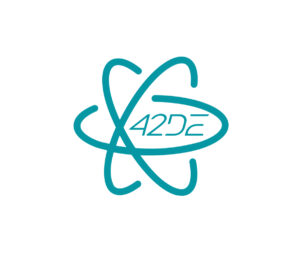
We build a Resilient and Thriving
Quantum Economy!
QBN is the global industry network and consultancy for quantum technologies promoting commercialization and collaboration, shaping policies and driving industry adoption.
Founded in 2020, QBN, represents over 100 international members across the entire value chain, incl. world-leading startups, enterprises, RTOs, investors, and governmental organisations, developing and using quantum technologies, including quantum computing, quantum sensing, quantum communication, and quantum cybersecurity.
QBN builds the industrial quantum powerhouse, driving national security, technological sovereignty, economic growth and a sustainable future.
QBN is the global industry network and consultancy for quantum technologies promoting commercialization and collaboration, shaping policies and driving industry adoption.
Founded in 2020, QBN, represents over 100 international members across the entire value chain, incl. world-leading startups, enterprises, RTOs, investors, and governmental organisations, developing and using quantum technologies, including quantum computing, quantum sensing, quantum communication, and quantum cybersecurity.
QBN builds the industrial quantum powerhouse, driving national security, technological sovereignty, economic growth and a sustainable future.
QBN is the global industry network and consultancy for quantum technologies promoting commercialization and collaboration, shaping policies and driving industry adoption.
Founded in 2020, QBN, represents over 100 international members across the entire value chain, incl. world-leading startups, enterprises, RTOs, investors, and governmental organisations, developing and using quantum technologies, including quantum computing, quantum sensing, quantum communication, and quantum cybersecurity.
QBN builds the industrial quantum powerhouse, driving national security, technological sovereignty, economic growth and a sustainable future.
Quantum Technologies have the potential to transform various industries like healthcare, finance and materials science, and the way we live. By accelerating drug discovery, enhancing cybersecurity, and creating new materials, these technologies enable us to kick-start a new economic era.
Together we can drive the adoption of quantum technologies and turn quantum into a global industrial powerhouse paving the way for a healthy, united, sovereign and secure future.
Quantum Technologies have the potential to transform various industries like healthcare, finance and materials science, and the way we live. By accelerating drug discovery, enhancing cybersecurity, and creating new materials, these technologies enable us to kick-start a new economic era.
Together we can drive the adoption of quantum technologies and turn quantum into a global industrial powerhouse paving the way for a healthy, united, sovereign and secure future.
QBN gathers 100+ members from R&D to providers to industry end-users; corporates, SMEs and startups to RTOs and universities to government organizations and investors that are working in the field of quantum technologies including quantum computing, quantum communication and quantum sensing and their entire value chains.
QBN gathers 100+ members from R&D to providers to industry end-users; corporates, SMEs and startups to RTOs and universities to government organizations and investors that are working in the field of quantum technologies including quantum computing, quantum communication and quantum sensing and their entire value chains.
Join the leading quantum network and accelerate your business!
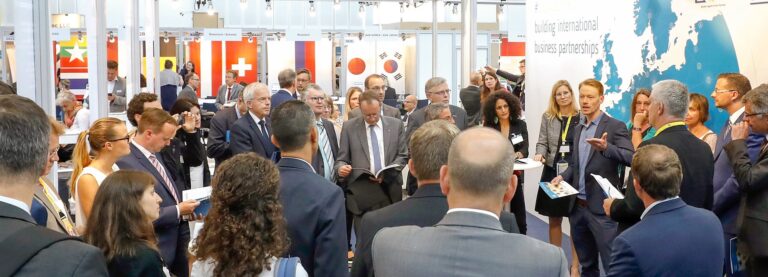
Create a supportive and flourishing environment for your company and the quantum community by joining our public policy and community activities.
Create a supportive and flourishing environment for your company and the quantum community by joining our and community and lobbying activities.
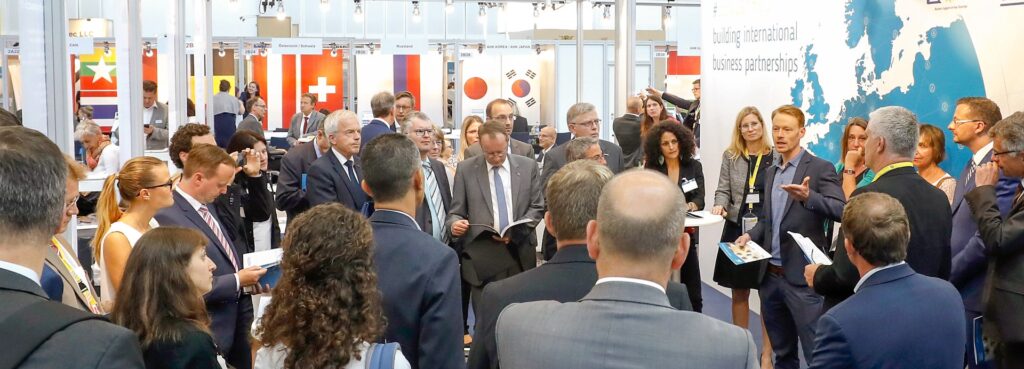
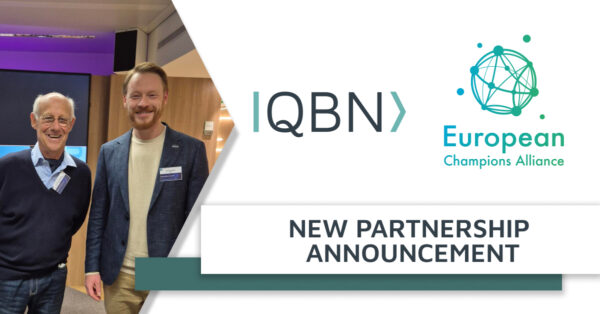
Munich, Paris, 11 December 2025 – Technological innovation is rapidly reshaping Europe’s industrial landscape, from advanced computing and cybersecurity to emerging areas such as quantum computing, quantum sensing and AI. Turning research breakthroughs into practical applications and these into economic impact requires collaboration across industry, research, investors, and public bodies. Recognising the need for a European Economy driven by deeptech champions and European values, the European Champion Alliance (ECA) and the Quantum Business Network (QBN) have joined forces to support a thriving and resilient deeptech ecosystem, leverage cross-sector collaborations between quantum, AI, cybersecurity and the wider deeptech sector, and enable European champions to scale and grow. Through this partnership, our members can connect with peers, explore opportunities and drive commercialisation and adoption across industries. It encourages the sharing of ideas, knowledge and experiences, and it facilitates the engagement in initiatives such as innovation challenges or joint discussions, helping to translate emerging technologies into practical applications. The collaboration also addresses wider strategic concerns, including cybersecurity and technological sovereignty, supporting a resilient and sustainable economy in Europe. By combining their complementary expertise and resources, ECA and QBN are committed to drive innovation, investment, and policy shaping to strengthen Europe’s position across future technologies, contributing to a resilient and competitive Europe. “At the European Champions Alliance, we are truly delighted to build this partnership with QBN. Quantum computing and quantum technologies represent one of the most strategic and promising fields of innovation for Europe. We firmly believe that strengthening cooperation across borders, connecting partners, and bringing together the key stakeholders of the quantum ecosystem is essential for Europe’s technological sovereignty and long-term competitiveness. This is why we are excited to join forces with QBN: together, we will support each other’s actions to develop a strong, collaborative, and vibrant European community of quantum players. We look forward to contributing to a shared momentum that accelerates innovation and reinforces Europe’s leadership in this critical domain.” Andrea Vaugan & Dominique Tessier, Co-Founders of the European Champions Alliance “QBN is thrilled to partner with the European Champions Alliance emphasising the commitment of the deeptech industry to drive economic impact of quantum technologies, AI, cybersecurity and beyond across Europe. Europe has all it takes to build deep technologies. Now, it is time to build a European market and accelerate the adoption. Together with ECA and our members and partners we are building the backbone of a secure, sovereign and competitive Europe. Collaboration of networks like QBN and ECA hold so much potential not only between their members, but also on network level. Let’s shape a connected, resilient and thriving Europe driven by quantum and deeptech innovation.” Johannes Verst, CEO of QBN About ECA The European Champions Alliance (ECA) is a not-for-profit initiative that supports European technological advancement. It brings together startups, SMEs, corporations, investors, and other stakeholders to foster collaboration, accelerate growth, and empower European companies. By connecting different actors across the tech ecosystem, ECA helps members access the resources, knowledge, and partnerships they need to scale. About QBN QBN is the global industry network and consultancy for quantum technologies promoting commercialization and collaboration, shaping policies and driving industry adoption. Founded in 2020, QBN, represents over 100 international members across the entire value chain, incl. world-leading startups, enterprises, RTOs, investors, and governmental organisations, developing and using quantum technologies, including quantum computing, quantum sensing, quantum communication, and quantum cybersecurity. QBN builds the industrial quantum powerhouse, driving national security, technological sovereignty, economic growth and a sustainable future.
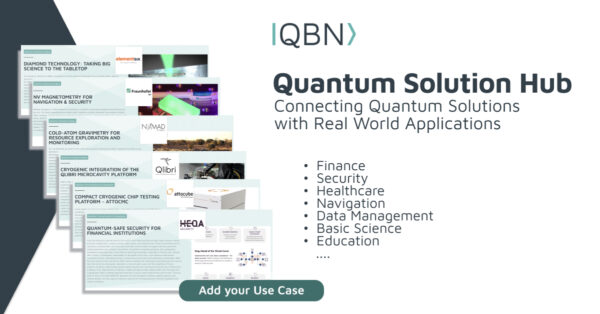
Munich, 10 Dec 2025 — QBN has launched the Quantum Solution Hub, a new platform providing organisations with direct access to applied quantum solutions that tackle real challenges in industries, research and education. The Hub consolidates practical examples from across the QBN network into one trusted reference point, giving end-users clear visibility into what quantum technologies can deliver today. It includes use cases spanning the quantum spectrum—from quantum computing and simulation, quantum communication and cybersecurity, quantum sensing and imaging, to enabling technologies such as diamond, photonics and cryogenics. Enterprises can now thoroughly explore and evaluate concrete quantum-enabled solutions relevant to their sector, from improving security and healthcare diagnostics to modernising data management and navigation capabilities. While quantum research in Europe is strong, practical examples are often hard to find, limiting adoption and slowing private investment. The Hub brings these solutions together, while offering insight into how leading organisations are applying quantum in practice, providing lessons that can inform strategy, accelerate adoption, and help enterprises position themselves ahead in this rapidly evolving market. “Europe has world-class research and a strong landscape of deep-tech innovators, but enterprises often struggle to see where quantum technologies already solve concrete problems and why they matter for their business. The Quantum Solution Hub gives end-users clear visibility into real-world applications, and shows how these technologies can address operational, security, or performance challenges in a practical way. By providing transparent, relatable examples, the Hub enables organisations to move from general curiosity to informed decision-making grounded in measurable outcomes, helping them assess the relevance and impact of quantum solutions for their specific needs,” said Haissam Hanafi, Quantum Technology Manager at QBN. Explore The Quantum Solution Hub: QBN › Use Cases Clearly, quantum technologies are no longer confined to research labs. Enterprises across sectors are already embedding quantum solutions into their operations, gaining tangible advantages and setting new industry standards. For organisations yet to begin their quantum journey, now is the moment to explore, adopt, and develop an approach that positions them at the forefront of this transformative technology. Contact us today to start shaping your tailored quantum strategy.
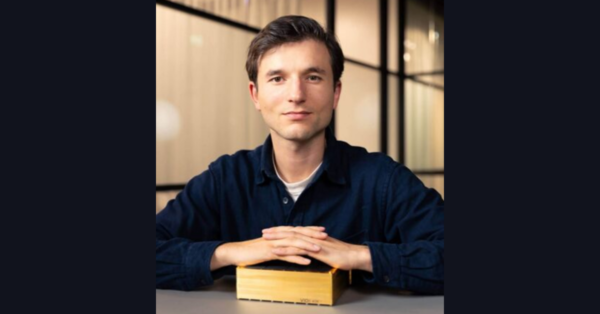
Delft, The Netherlands — December 9th, 2025 // QuantWare today announced VIO-40K™, a new generation of its breakthrough Quantum Processor Unit (QPU) scaling architecture VIO™ that enables the creation of QPUs with 10 KiloQubits (ten thousand qubits). This is 100x larger than anything available in the industry today, and exponentially more powerful, yet it fits in a smaller package than today’s QPUs. For almost a decade, the quantum industry has been stuck at maximum QPU sizes of about 100 qubits. Google’s quantum chips went from 53 to 105 qubits in six years, and IBM recently unveiled a 120-qubit QPU that will be the leading device size in 2028, according to its latest roadmap. This is due to scaling bottlenecks in the QPU hardware itself. This has forced the industry on a path to larger systems by networking many small processors, leading to prohibitively high total cost of ownership. QuantWare’s VIO 3D scaling architecture solves the QPU scaling bottlenecks, unlocking very large QPUs for the first time. VIO-40K supports 40,000 input–output lines and consists entirely of chiplet modules connected to each other via ultra-high-fidelity chip-to-chip connections. This in return provides exponentially more compute per dollar and per watt compared to systems built out of many smaller QPUs connected over low-fidelity network connections. QuantWare’s VIO is available to the entire industry, making it the scaling standard. VIO is capable of scaling up every qubit design, so any organization working with superconducting qubits can now make much more powerful QPUs. QuantWare continues to expand its ecosystem around VIO-40K via the Quantum Open Architecture (QOA). QuantWare announced that NVIDIA NVQLink, the open platform to build logical QPUs, is part of the VIO-40K compatible ecosystem. NVIDIA NVQLink combined with VIO, integrates hyperscaled quantum compute with a low-latency, high-throughput connection to classical AI supercomputing and provides a developer interface to these resources via the NVIDIA CUDA-Q platform. When combined, VIO and NVQLink enable the leaps in scale that the quantum computing industry requires. QuantWare also announced it is building Kilofab, an industrial-scale QPU fab scheduled to open in 2026 to manufacture VIO-40K processors at scale. Kilofab will be the world’s first dedicated fab for QOA devices, and one of the world’s largest quantum fabs. QuantWare is the largest commercial provider of quantum hardware by volume in the world today, and Kilofab will increase its production capacity by 20 times. Kilofab will be located at the company’s headquarters in Delft, The Netherlands. “For years, people have heard about quantum computing’s potential to transform fields from chemistry to materials to energy, but the industry has been stuck at 100-qubit QPUs forcing the field to theorize about interesting but far-off technologies,” said Matt Rijlaarsdam, CEO of QuantWare. “QuantWare’s VIO finally removes this scaling barrier, paving the way for economically relevant quantum computers. With VIO-40K, we’re giving the entire ecosystem access to the most powerful, hyper-scaled quantum processor architecture ever.” VIO-40K reservations are available today through direct request, with the first devices shipping to customers in 2028. About QuantWare QuantWare is building the world’s most powerful quantum processors, and is today the highest-volume supplier of quantum processing units (QPUs) worldwide, with customers in more than 20 countries. Its unique VIO™ 3D scaling architecture is the only technology that unlocks MegaQubit-scale, ultra-high-speed quantum processors, delivering exponentially more performance per Watt per dollar invested. VIO paves the way for the hyper-scale quantum computers that will solve humanity’s greatest challenges. The company was founded in 2021 by quantum computing experts Matt Rijlaarsdam and Alessandro Bruno as a spin-out from QuTech, a globally-leading quantum computing research institute, part of TU Delft in the Netherlands.
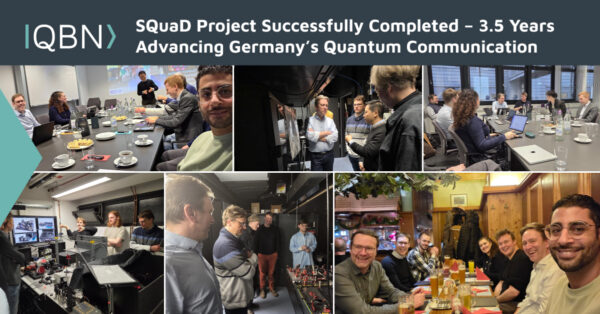
Hannover, 09 Dec 2025 – On 08-09 December 2025, the SQuaD consortium convenes in Hannover for the final meeting of the umbrella project Schirmprojekt Quantenkommunikation Deutschland, funded by the Federal Ministry for Research, Technology and Space (Bundesministerium für Forschung, Technologie und Raumfahrt – BMFTR). As the project approaches its conclusion after nearly three and a half years, the partners take the opportunity to reflect on their achievements and to define perspectives for the continued advancement of Quantum Communication in Germany and Europe. SQuaD was launched in 2022 with the goal of accelerating the commercialization of Quantum Communication and building a well-connected, collaborative ecosystem across research, industry, and public institutions. With nearly 9 million euros in funding, the project brought together key organizations along the entire innovation chain to strengthen technological sovereignty and prepare industry for quantum-secure communication. Reflecting on 3.5 Years of Joint Progress During the two-day final meeting, the consortium looks back on the progress made towards strengthening research–industry collaboration, the development of tools and methods to support commercialization, contributions to standardization and certification efforts, and its role in advancing Germany’s competitive position in the global Quantum Communication landscape. In addition to celebrating achievements, the partners also engage in a self-critical review to derive best practices, lessons learnt and recommendations for the years ahead. The discussions focus on ecosystem needs, remaining gaps, and opportunities for a potential continuation phase, ensuring that the progress made can be sustained and further expanded. QBN’s Contribution and Future Role As a consortium partner, QBN led the work on innovation promotion, technology transfer and networking. Over the course of the project, QBN developed tools and formats to support commercialization, facilitated workshops on industry use cases, integration, supply chains, policy and certification, supported startups and SMEs with dedicated resources and the SQuaD startup toolkit, and launched the SQuaD Networking Platform to connect stakeholders and foster long-term collaboration. Looking ahead, QBN is well positioned to help carry forward successful SQuaD activities for the benefit of the community. In close collaboration with partners across research, industry and policy, QBN will continue to maintain effective formats, strengthen collaboration structures, and support initiatives that advance the commercialization of Quantum Communication. With established support structures, including our Working Group Quantum Communications & Cybersecurity, which connects key stakeholders and drives technical, industrial and strategic progress, QBNplays a meaningful role in building on the project’s outcomes. This aligns with the High-tech Agenda Deutschland, where Quantum Communication is defined as one of the four central goals within the Quantum Technologies priority area, one of the six strategic pillars of the agenda. By contributing to these national priorities, QBN supports Germany’s ambition to remain at the forefront of Quantum Communication globally. The final meeting marks the end of an important phase and opens the door to new opportunities for strategic ecosystem development, collaboration, and sustainable growth of the European Quantum Communication industry.



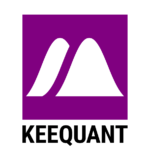


Bringing together end-users and developers with suppliers and integrators in a trust-based environment creates the perfect foundation for valuable business and collaboration opportunities

Bringing together end-users and developers with suppliers and integrators in a trust-based environment creates the perfect foundation for valuable business and collaboration opportunities